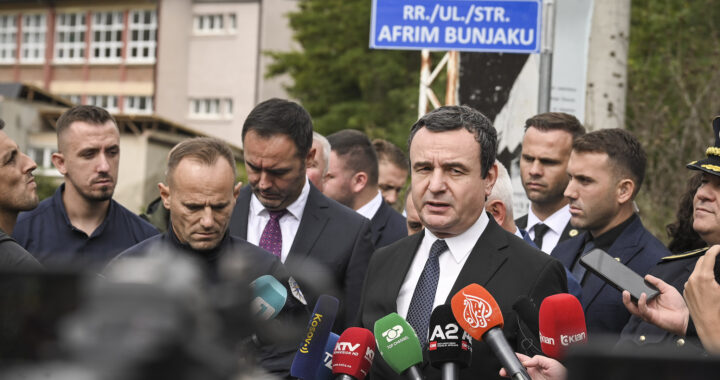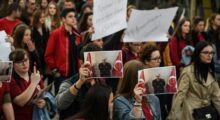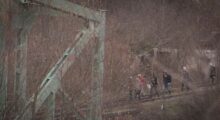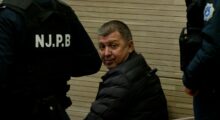One year after Kosovo Police sergeant Afrim Bunjaku was killed when Serb gunmen led by Kosovo Serb kingpin Milan Radoicic attacked police in the village of Banjska, the authorities renamed a road leading to the village after him.
Prime Minister Albin Kurti, members of the cabinet, parliament speaker Glauk Konjufca and police director Gazmed Hoxha visited the site where Bunjaku was killed and unveiled the new road sign commemorating the slain policeman.
Kurti said the September 24, 2023 attack in Banjska “was a plan to attack Kosovo, it was an aggression against state sovereignty, territorial integrity, peace, security, constitutionality and legality”, which he said could be proved by the arsenal of weapons seized by police after the attack.
“Precisely for this reason, since we never forget this, today in this place we unveiled the sign which marks the new name of this road, ie. ‘Afrim Bunjaku’,” he added.
On September 11, Kosovo’s Special Prosecution charged Radoicic and 42 other individuals with terrorism and endangering the constitutional order of the country. Radoicic, together with his business partner, Radule Stevic, and his company, RAD D.O.O., are also charged with money-laundering.
According to the indictment, which has been see by BIRN, Radoicic had been financing the criminal activities of a “structured terrorist group” since 2017.
This included the purchase of heavy weapons and military uniforms, all with the aim of “separating” Kosovo’s four northern Serb-majority municipalities from the rest of the country “to join them with the Republic of Serbia”.
The indictment claims that Radoicic rallied local Serbs against any step taken by Kosovo’s authorities and deemed undesirable by Belgrade, mounting roadblocks and barricades.
Kurti said on Tuesday that Kosovo is seeking help from the US and EU to secure his arrest “because Milan Radoicic and other criminals must be handed over to the Kosovo Police, the Kosovo authorities, and face justice”.
Radoicic, who is now in Serbia, has made no public comment about the indictment so far. He is also being investigated by Belgrade prosecutors for organising an armed group, the unauthorised amassing of a large cache of weapons, which he transported to Kosovo, and “serious crimes against general security”.
In October last year, a Belgrade court refused to detain Radoicic but ordered him not to leave the country and confiscated his passport.
Kurti insisted that “Serbia is responsible” for the Banjska attack. Radoicic, who is now in Serbia, has admitted leading the assault but has insisted he did so without informing authorities in Belgrade.
Kosovo’s prosecution alleges that initial preparations for the Banjska attack began in October 2021, at a meeting between Serbian President Aleksandar Vucic and Kosovo Serb representatives. Vucic has said the Serbian state had nothing to do with Radoicic’s actions.
After the commemorations of Bunjaku’s death, the US ambassador to Kosovo, Jeff Hovenier, wrote on X that “the United States reiterates its call, and it is our expectation, that the perpetrators and all those who were involved in that horrific crime are held fully accountable”.
EU spokesperson Peter Stano wrote on X that the EU “reiterates the call for swift prosecution of those responsible”.
Stano said the attack was a “reminder of the need for continued efforts to maintain security” and to progress with the normalisation of relations between Ksoovo and Serbia”.
EU High Representative Josep Borrell retweeted his statement from last year in which he condemned “the hideous attack by an armed gang against Kosovo Police officers in Banjska/Banjskë in the north of Kosovo, which left one police officer dead and two injured”, adding that “the responsible perpetrators must face justice”.




























